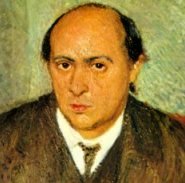|
Xtend
 Listen
Listen
 Period
Period
 Country
Country
 Quotation
Quotation
 Projects
Projects
 Dictionary
Dictionary
 Finders
Finders
|
Born: 13 September
1874, Vienna, Austria
Died: 13 July 1951, Los Angeles, USA
 Schönberg,
Arnold Schönberg,
Arnold
The Jewish bank clerk who became
the composer with the most influence in the 20th century, and the person
who gave atonality  its form. Schönberg started his
musical career as a Romantic
its form. Schönberg started his
musical career as a Romantic artist, and a known piece from that period is the "Transfigured
Night" ("Verklärte Nacht"),
in which Wagner's
artist, and a known piece from that period is the "Transfigured
Night" ("Verklärte Nacht"),
in which Wagner's and Richard Strauss's
and Richard Strauss's impact is clear and evident. But the revolution that will alter the face
of art music was yet to come: Schönberg decided to give up tonality
impact is clear and evident. But the revolution that will alter the face
of art music was yet to come: Schönberg decided to give up tonality and the keys that formed the basis for western music for hundreds
of years. He created the twelve-tone technique
and the keys that formed the basis for western music for hundreds
of years. He created the twelve-tone technique ,
according to which the 12 tones of the chromatic scale are equally important
and there are no stable and unstable notes. Thus, he undermined the entire
foundation of harmony ,
according to which the 12 tones of the chromatic scale are equally important
and there are no stable and unstable notes. Thus, he undermined the entire
foundation of harmony and melody
and melody .
The 12 notes of the "sound series" are prefixed in order, and
the entire work is based on repeating this series and its variations (manipulations
upon the melody such as inversion and retrograde, combining the notes into
chords etc.). Harmony and rhythm .
The 12 notes of the "sound series" are prefixed in order, and
the entire work is based on repeating this series and its variations (manipulations
upon the melody such as inversion and retrograde, combining the notes into
chords etc.). Harmony and rhythm are completely free in this method. Schoenberg's 'Theory of Harmony'
was dedicated to Gustav Mahler
are completely free in this method. Schoenberg's 'Theory of Harmony'
was dedicated to Gustav Mahler who supported him both artistically and financially.
who supported him both artistically and financially.
The system caused great controversy
between opponents, those who considered it too "intellectual",
and started riots during the performance of Schönberg's works, and
the young composers who liked it, like Berg and Webern
and Webern ,
who gallantly defended it as a method that fits its era. With
Schönberg, they are all known as the Second Viennese School. ,
who gallantly defended it as a method that fits its era. With
Schönberg, they are all known as the Second Viennese School.
Schönberg, also a talented expressionist painter,
gradually became a highly influential figure, and
the number of his students and followers who became central composers in
the 20th century ,
such as Stockhausen ,
such as Stockhausen ,
speaks of his ability as a teacher. He demanded from his students
broad knowledge of traditional music, its rules and styles, and prohibited
composing in his style during the learning. His pedagogic writings excel
in precise, efficient explanations. ,
speaks of his ability as a teacher. He demanded from his students
broad knowledge of traditional music, its rules and styles, and prohibited
composing in his style during the learning. His pedagogic writings excel
in precise, efficient explanations.
In his instrumental works, like the Suite
for Seven Instruments, he demonstrated his fascinating methodology,
and in his vocal works, like "Moonstruck Pierrot"
("Pierrot lunaire") for chamber ensemble
and voice, he used Sprechgesang technique, words half spoken, half sung,
he developed further in his operas ,
such as in "Moses und Aron". ,
such as in "Moses und Aron".
He spent his early career in Berlin.
In 1933, after the rise to power of the Nazis, he left Germany ,
and settled in the USA ,
and settled in the USA .
There he influenced the music scoring for films .
There he influenced the music scoring for films .
Alongside Stravinsky .
Alongside Stravinsky ,
Schönberg is considered one of the two most important composers in
the 20th century. ,
Schönberg is considered one of the two most important composers in
the 20th century.

Schönberg on the WWW
 Sites
Sites
|
 Audio
Audio
|
 Video
Video
|
 Images
Images
|
 MIDI
MIDI
|
|
Description
He Was

He Lived in the
 Twentieth Century
Twentieth Century
In
 Austria
Austria
|